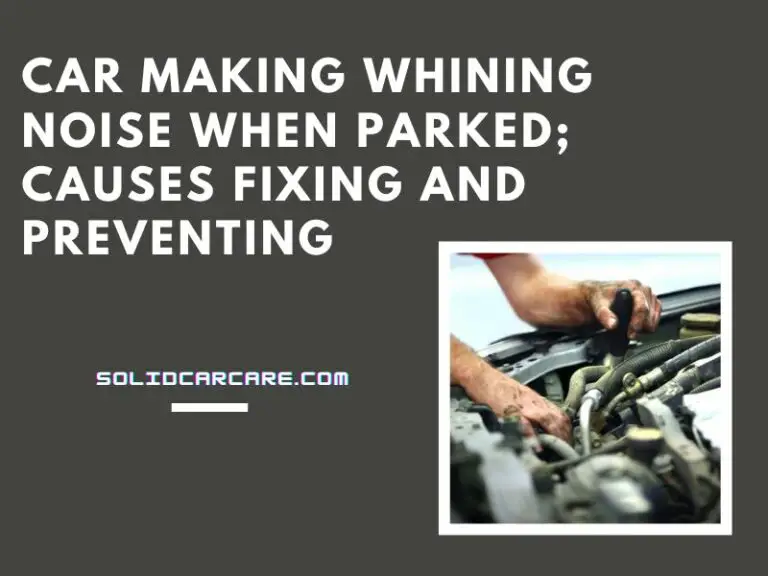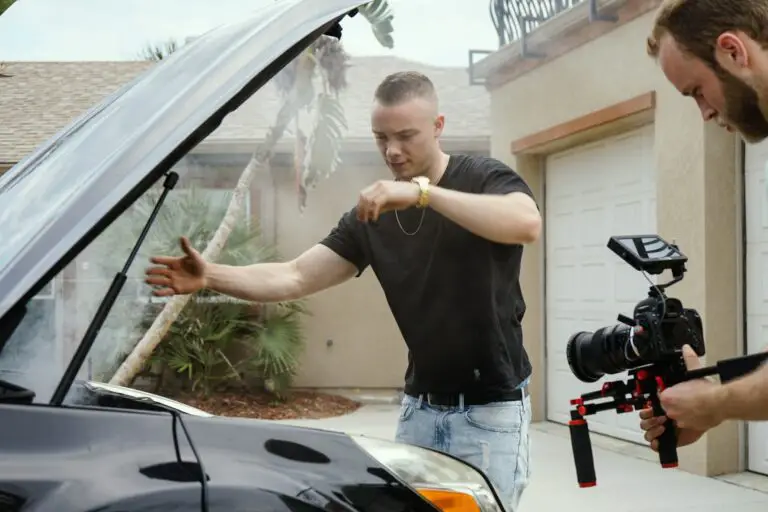Buzzing Sound When Car is Off; Causes, DIagnosing and Troubleshooting

Have you ever experienced the perplexing situation of hearing a mysterious buzzing sound emanating from your car when it’s turned off? It can be both puzzling and worrisome, leaving you wondering what could be causing this strange noise.
In this article, we’ll delve into the possible reasons behind this phenomenon and discuss the importance of addressing it promptly to avoid potential complications.
Table of Contents
What are the Common Causes of the Buzzing Sound when the car is off?

Before diving into specific causes, it’s essential to understand that a buzzing sound when your car is off can originate from various sources. Here are some of the most common culprits:
Electrical Systems and Components
Modern cars are equipped with a myriad of electrical systems and components that facilitate various functions, such as power locks, security systems, and infotainment features. When these systems malfunction or experience issues, they may produce buzzing sounds even when the car is not running.
To pinpoint the cause of electrical-related buzzing noises, it’s crucial to identify which system or component is responsible. Common suspects include malfunctioning relays, faulty solenoids, or a failing battery. Proper diagnosis and repair of the electrical components can alleviate the buzzing issue and prevent potential electrical problems in the future.
Fuel System Issues
Another potential source of buzzing sounds lies within the car’s fuel system. The fuel pump, which is responsible for delivering fuel from the tank to the engine, can sometimes generate a buzzing noise due to various factors. A clogged fuel filter, a weak fuel pump, or excessive pressure within the system can contribute to the unsettling sound.
If left unaddressed, fuel system issues can lead to poor engine performance and even stalling. Therefore, it’s essential to promptly address buzzing sounds related to the fuel system to ensure the car’s overall health and performance.
Mechanical Vibrations
Mechanical vibrations can also cause buzzing sounds in a car, even when the engine is not running. These vibrations may originate from loose or worn-out components, such as exhaust hangers, heat shields, or engine mounts. As the car cools down after being driven, these components may contract and produce buzzing noises as they settle.
Identifying the specific components causing the vibrations can be challenging, but careful inspection and tightening or replacing the affected parts can resolve the issue and prevent further buzzing noises.
Aftermarket Modifications
If your car has undergone aftermarket modifications, they could be the reason behind the buzzing sound. Modifications like aftermarket alarms, speakers, or lighting systems may not integrate perfectly with the car’s original wiring, causing electrical interference and generating buzzing noises.
To address this, it’s important to ensure that any aftermarket modifications are installed correctly and do not interfere with the car’s existing electrical systems. If needed, consult a professional installer to rectify any issues and eliminate the buzzing sound.
Gurgling Sound After Turning Car Off: Causes and Fixes
Causes:
The gurgling sound heard after turning off a car is often a result of coolant or refrigerant moving through the vehicle’s cooling system. When the engine is shut down, the hot coolant or refrigerant can circulate briefly, leading to the gurgling noise. This phenomenon occurs due to the residual heat in the engine and the cooling system’s design.
Fixes:
The gurgling sound after turning off the car is typically harmless and doesn’t indicate a serious issue. However, if you find the noise bothersome, there are a few simple ways to address it:
- Regular Maintenance: Ensure that the vehicle’s cooling system is well-maintained. Regularly check coolant levels and top them up if needed. Also, make sure the cooling system is free from leaks.
- Proper Cool Down: After driving, allow the engine to idle for a minute before turning it off. This allows the hot coolant to circulate and dissipate some of the residual heat, potentially reducing the intensity of the gurgling sound.
- Consult a Mechanic: If the gurgling sound is excessively loud or accompanied by other cooling system issues, it’s best to seek advice from a qualified mechanic. They can inspect the cooling system for any underlying problems and perform any necessary repairs or maintenance.
Remember that the gurgling sound is often a normal part of a car’s cooling system operation. However, if you have any concerns or notice any other unusual symptoms, seeking professional assistance can help ensure your car remains in optimal condition.
Diesel Car Making Noise When Turned Off: Causes and Fixes
Causes:
- Diesel Knocking
A common cause of noise after turning off a diesel car is diesel knocking. This occurs when the fuel ignites spontaneously due to high compression and temperature inside the cylinders. After the engine is shut down, residual heat and pressure can lead to a series of small detonations, creating a knocking or pinging sound.
- Turbocharger Residue
Many diesel cars are equipped with turbochargers to increase engine efficiency and power. When the engine is turned off, the turbocharger’s spinning components may continue to rotate due to inertia, generating a whining or spinning noise as they gradually come to a stop.
- Exhaust System Cooling
Diesel engines produce a significant amount of heat during operation, and this heat extends to the exhaust system. When the car is turned off, the hot exhaust components can cool down and contract, causing ticking or pinging noises.

- Injector Rattle
Diesel engines use injectors to spray fuel into the cylinders. Sometimes, after the engine is turned off, the injectors can continue to vibrate or rattle due to the pressure changes, resulting in a ticking or clattering sound.
Fixes:
- Diesel Knocking
To reduce diesel knocking noises, ensure you’re using high-quality diesel fuel with the right cetane rating recommended by the manufacturer. Additionally, using fuel additives designed to improve combustion can help. Regular engine maintenance, including fuel injector cleaning and proper timing adjustments, can also minimize diesel knocking.
- Turbocharger Residue
The spinning noise from the turbocharger can be reduced by allowing the engine to idle for a short period before turning it off. This helps the turbocharger components gradually come to a stop.
If the noise persists, consider installing a turbo timer, which allows the engine to run for a short time after the car is turned off, enabling a smoother shutdown for the turbocharger.
- Exhaust System Cooling
To mitigate the pinging sounds from the cooling exhaust system, ensure that the exhaust system is well-insulated and properly secured.
Using heat-resistant materials and avoiding aftermarket modifications that interfere with the exhaust layout can also help reduce the noise.
- Injector Rattle
If injector rattle is a concern, using high-quality diesel fuel and additives designed to lubricate and maintain injector performance can help reduce the noise.
Regular inspection and maintenance of the fuel injection system, including checking for worn or damaged injectors, can also prevent excessive rattling.
The noise produced by a diesel car after it is turned off can be caused by various factors, including diesel knocking, turbocharger residue, exhaust system cooling, and injector rattle. While some of these noises are normal and harmless, proper maintenance, fuel quality, and using additives or accessories can help minimize or eliminate the bothersome sounds, ensuring a quieter and smoother experience with your diesel vehicle.
Actuator Clicking When Car Is Off; Causes, Fixing, And Prevention
solidcarcare.com
Conclusion
A buzzing sound when your car is off can be a puzzling and unnerving experience. By understanding the common causes behind this issue, such as electrical malfunctions, fuel system problems, mechanical vibrations, or aftermarket modifications, you can take the necessary steps to identify and resolve the problem. Whether it’s a DIY fix or a job for a professional mechanic, addressing the buzzing sound promptly ensures the overall health and performance of your vehicle, allowing you to enjoy a peaceful and quiet driving experience.






